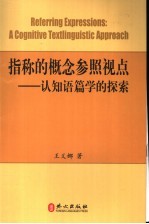
- 作 者:王义娜著
- 出 版 社:北京:外文出版社
- 出版年份:2006
- ISBN:7119020358
- 标注页数:305 页
- PDF页数:322 页
请阅读订购服务说明与试读!
订购服务说明
1、本站所有的书默认都是PDF格式,该格式图书只能阅读和打印,不能再次编辑。
2、除分上下册或者多册的情况下,一般PDF页数一定要大于标注页数才建议下单购买。【本资源322 ≥305页】
图书下载及付费说明
1、所有的电子图书为PDF格式,支持电脑、手机、平板等各类电子设备阅读;可以任意拷贝文件到不同的阅读设备里进行阅读。
2、电子图书在提交订单后一般半小时内处理完成,最晚48小时内处理完成。(非工作日购买会延迟)
3、所有的电子图书都是原书直接扫描方式制作而成。
Chapter 1 Introduction 1
1.1 Reference 1
1.2 Discourse reference 3
1.3 Objectives of this study 7
1.4 Basic assumptions and research methodology 11
1.5 Organization of the book 13
Chapter 2 Previous Researches on Discourse Reference 14
2.1 Textual approaches to discourse reference 15
2.1.1 Halliday Hasan:Textual paradigm 15
2.1.2 Givón:Topic continuity model 18
2.1.3 Fox:the Hierarchy model 21
2.2 Pragmatic approaches to discourse reference 24
2.2.1 Levinson:Neo-Gricean pragmatic model 25
2.2.2 Matsui:Relevance-theoretical model 29
2.3 Cognitive approaches to discourse reference 32
2.3.1 Ariel:Accessibility theory 32
2.3.2 Gundel et al.:the Givenness hierarchy 36
2.3.3 Two given-new taxonomies 40
2.4.1 Li Cherry Ing:a text-oriented analysis 44
2.4 Chinese researches on discourse reference 44
2.4.2 Chen Ping:a discourse-pragmatic analysis 45
2.4.3 Huang Yan:a neo-Gricean pragmatic model 46
2.4.4 Xu Yulong:a functional-pragmatic model 49
2.5 Summary 51
Chapter 3 A Conceptual Framework to Discourse Reference 55
3.1 Theoretical arguments revisited 55
3.1.1 A study of Givenness 56
3.1.2 Accessibility:contributions and limitations 58
3.2 The role of subjectivity in discourse 62
3.3 A conceptual framework to discourse reference 65
3.3.1 Conceptual basis of the model 66
3.3.2 Conceptual reference-point model of discourse reference 75
3.3.3 Interim summary 89
3.4 Summary 93
Chapter 4 The Choice of Lexical Reference in Discourse 96
4.1 Lexical devices in discourse 97
4.2 Discourse conditions for lexical reference 98
4.2.1 Low-accessible conditions 99
4.2.2 Discourse boundary positions 101
4.2.3 Referent-accessible conditions 104
4.3 A CRM analysis of lexical reference 107
4.3.1 Reference point and conceptual prominence 108
4.3.2 Dominion closure and conceptual connectivity 116
4.3.3 Viewpoint effect on conceptual connectivity 124
4.4 Summary:low-subjective construal of the referent 154
Chapter 5 The Choice of Pronominal Reference in Discourse 156
5.1 Pronominal referential devices 157
5.2 The use of pronominal reference in discourse 158
5.2.1 Discourse conditions for pronominal reference 159
5.2.2 A CRM analysis of pronominal reference 164
5.3 The use of pronominal shifters in discourse 181
5.3.1 We as a pronominal shifter 182
5.3.2 You as a pronominal shifter 186
5.3.3 Third-person pronominal shifter 191
5.4 The use of reflexive pronouns in discourse 195
5.4.1 Discourse conditions for reflexive reference 196
5.4.2 A CRM analysis of reflexive reference 198
5.4.3 Distinction in viewing relationship 206
5.5 Summary:semi-subjective referential markers 216
Chapter 6 The Choice of Zero Reference in Discourse 217
6.1 Zero reference:a least-coding device 217
6.2 Discourse conditions for zero reference 218
6.2.1 High-accessible conditions 219
6.2.2 Low-accessible conditions 221
6.3 A CRM analysis of zero reference 225
6.3.1 Conceptual prominence and proximity 226
6.3.2 Conceptual prominence and antecedence 232
6.3.3 Conceptual prominence and connectivity 238
6.3.4 Maximal subjectivity and viewpoint effect 248
6.4 Covert vs.overt coding of reference 271
6.5 Summary:subjective construal of the referent 274
Chapter 7 Conclusions and Further Implications 276
7.1 Conclusions 276
7.2 Limitations and implications 284
Bibliography 286
Acknowledgements 304
